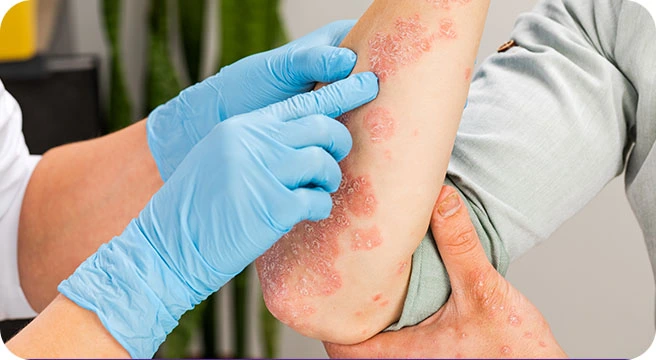Is eczema a fungal infection? Demystifying the Relationship Between Eczema and Fungal Infections: Unraveling the Complex Connection
Eczema and fungal infections are two distinct skin conditions that share some similarities, leading to speculation about a potential link between them. As researchers continue to delve into the complexities of these skin issues, it is essential to understand the nuances of each condition and how they interact. In this comprehensive blog post, we will explore the science behind eczema and fungal infections, investigate the possible association between the two, and shed light on the best practices for managing both conditions. And you Get the answer of question Is eczema a fungal infection?
Eczema: Causes and Characteristics
Eczema, scientifically known as atopic dermatitis, is a chronic skin disorder that affects people of all ages, from infants to adults. It is characterized by inflamed, red, and itchy patches of skin that can appear anywhere on the body. The root cause of eczema is multifaceted, involving a combination of genetic predisposition, immune system dysfunction, and environmental factors.
Those with eczema often have a weakened skin barrier, which allows irritants and allergens to penetrate the skin easily, triggering inflammation and itching. As a result, affected individuals may experience recurrent flare-ups, making it a long-term challenge to manage this condition effectively.
Fungal Infections: Causes and Characteristics
Fungal infections of the skin are caused by various types of fungi, including dermatophytes, yeasts, and molds. These microscopic organisms thrive in warm, moist environments and can invade the skin through tiny breaks or wounds. Common fungal infections include athlete’s foot (tinea pedis), ringworm (tinea corporis), and candidiasis (yeast infection).
Unlike eczema, fungal infections are contagious and can spread from person to person through direct or indirect contact with infected individuals or contaminated surfaces. The classic symptoms of fungal infections include red, itchy rashes with well-defined edges, often forming circular patterns.

Potential Link Between Eczema and Fungal Infections
Over the years, some studies have observed a higher incidence of fungal infections in individuals with eczema compared to those without the skin condition. However, the precise nature of this relationship remains a subject of ongoing research and debate.
One possible explanation for the association is the compromised skin barrier in eczema patients, which creates an entry point for fungi. Frequent scratching in response to itching further damages the skin, providing fungi with an opportunity to infiltrate and cause infection. Additionally, the immune system dysregulation observed in eczema patients may contribute to an increased susceptibility to fungal infections.
Differentiating Eczema from Fungal Infections and Is eczema a fungal infection?
Distinguishing between eczema and fungal infections is vital for accurate diagnosis and effective treatment. You Get the answer of question Is eczema a fungal infection? While both conditions may exhibit redness and itching, several key differences can aid in differentiation:
- Rash appearance: Eczema rashes are often dry, scaly, and accompanied by small bumps, while fungal infections typically present as circular, well-defined patches with a raised edge.
- Location of the rash: Eczema commonly appears on the flexor surfaces of joints, such as the inner elbows and behind the knees. Fungal infections tend to affect areas with a higher concentration of sweat glands, such as the feet, groin, and armpits.
- Itchiness intensity: While both eczema and fungal infections cause itching, eczema-related itching may be more intense and persistent.

Treatment Approaches
Treatment for eczema and fungal infections varies significantly due to their distinct causes. For eczema, managing inflammation and keeping the skin hydrated are essential. Topical corticosteroids, emollients, and immunomodulators are commonly prescribed to reduce symptoms and prevent flare-ups.
Fungal infections, on the other hand, require antifungal medications in the form of creams, ointments, or oral drugs. These medications target the specific fungi responsible for the infection, effectively eradicating the pathogen. You Get the answer of question Is eczema a fungal infection?
Prevention and Management
Preventing both eczema flare-ups and fungal infections involves adopting good skincare practices and maintaining overall skin health. For eczema management, it is crucial to identify and avoid triggers, practice regular moisturization, and maintain a healthy lifestyle. Additionally, keeping the skin clean and dry can reduce the risk of fungal infections.
Individuals with eczema should take extra precautions in public places with high humidity and moisture, such as gyms and swimming pools, to minimize the risk of contracting fungal infections. Wearing flip-flops in communal showers and using clean, dry towels can help prevent fungal growth.
Read Also: What is Irritant Skin? Understanding the Causes, Symptoms, and Effective Treatments in 4+Way
Conclusion(Is eczema a fungal infection?)
While the association between eczema and fungal infections is not entirely clear-cut, research suggests that individuals with eczema may be more susceptible to fungal infections due to compromised skin integrity and immune dysregulation. However, it is essential to recognize that eczema itself is not a fungal infection; rather, it is a chronic inflammatory skin condition with a complex set of causes.
Understanding the differences between eczema and fungal infections is crucial for accurate diagnosis and effective treatment. Consulting a dermatologist for proper evaluation and personalized care is paramount for managing both conditions and achieving optimal skin health.
As scientific research continues to shed light on the intricate relationship between eczema and fungal infections, it is our responsibility to stay informed and raise awareness about these conditions, ultimately improving the lives of those affected by them. Through continued research and public education, we can pave the way for enhanced treatments and better outcomes for individuals battling eczema and fungal infections alike. And you Get the answer of question Is eczema a fungal infection?
For More-Fungal Infection vs Eczema Symptoms





